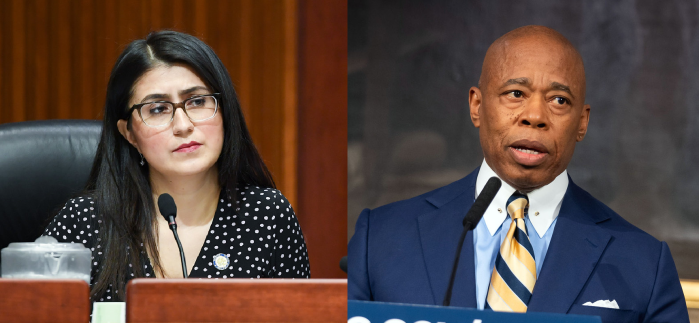By Matthew Monks
Community Board 2 last Thursday approved a rezoning scheme for Hunters Point designed to spur development despite a slew of manufacturers’ warnings that the change might hike their rents, forcing them from Long Island City.
The City Planning proposal would increase residential zoning in traditional manufacturing blocks such as Jackson Avenue and Vernon Boulevard, said Neil Gagliardi, of the Queens Planning Department, during the board’s meeting at the Citicorp building.
The rezoning would also open the neighborhood’s inner blocks to new commercial uses such as artist studios, restaurants, small theaters and custom printers, all of which are generally restricted in current residential zones, he said.
The plan is a complex, fine-grained scheme introducing seven separate mixed zonings within the 43 blocks between Court Square and Queens West on the East River, said John Young, director of the Queens office of City Planning.
It is intended to foster growth and brighten Long Island City while protecting the light-manufacturing industry that has characterized the area for more than a century, he said.
But several manufacturers who spoke during last Thursday’s meeting said residential rezoning would threaten their businesses with rent hikes, possibly costing the area thousands of blue-collar jobs.
“Office space and loft conversion, I understand, is the ever-evolving frontier for the real estate industry. For small manufacturers, these conversions are lethal,” said Ernest Allen Smith, president of Penn & Fletcher, a custom embroidery manufacturer with 17 employees in Long Island City.
“The city’s proposal for Hunters Point will not result in a mixed-use neighborhood — that is what is here today,” Smith said. “What will happen is that rents will rise and companies and jobs will be displaced.”
Smith was one of nearly a half dozen speakers who called on the city to create an industrial employment district in the area, which would shelter manufacturers from residential encroachment and its subsequent rate hikes.
“Introducing the possibility of zoning for residential in the Long Island City area is sure to constrict the available space stock for industry, even if the residential development zone is adjacent to my location,” said Edward Rosenblum, owner of LIC Screen Printing Inc., which has 25 employees. “With the prices of one-bedroom units in Manhattan at an all-time high, the pressure to convert will be enormous. If this price pressure were to force us from the area, the hardship on us would be great.”
While business owners such as these blasted the rezoning, several residents praised it and criticized the manufacturers for valuing cheap rents over quality of life.
Joseph Escarfullery said he and his wife built a five-story brownstone in Long Island City because they believed in the area’s potential. The zoning changes would bring new parks and restaurants — color that he said the area desperately needs.
“This (rezoning) doesn’t raise rents. People raise rents, and they’re going to raise their rents no matter what you do,” Escarfullery said.
Tibi Zicherman, who owns a real estate business and wholesale distributor in the area, said he was confident his operations would continue to thrive despite the changes.
“You guys that are against it — you’re very narrow-minded,” Zicherman said. “You just want to have cheap rent. You’re against progress.”
After more than three hours of discussion, the community board — which represents Long Island City, Sunnyside, Woodside and West Maspeth — overwhelmingly passed the zoning proposal in a 27-3 vote, amending it with three recommendations. The first would ban billboards on top of buildings that exceed 30 feet above street level. The second calls for an industrial employment zone, and the third would preserve the area’s historical buildings.
Young said the plan now goes to Borough President Helen Marshall for consideration. She has 30 days to make a recommendation before sending it back to the Planning Department, which will then review it within 60 days and send it to the City Council for final consideration. During each step in the approval, Young said each entity is required to hold a public hearing.
Reach reporter Matthew Monks by e-mail at news@timesledger.com or call 718-229-0300, Ext. 156.

































